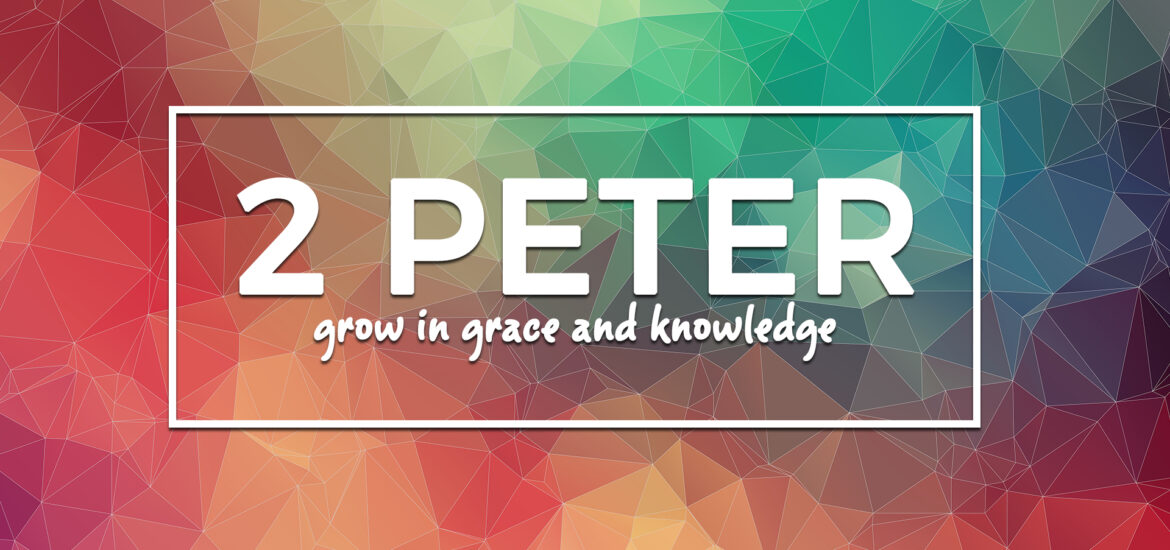Everything Needed
Devotions on 2 Peter 1:1-11
Monday—Everything Needed
“Simeon Peter, a servant and apostle of Jesus Christ” (2 Peter 1:1).
How do you describe yourself? Often, we do so by telling people what we do—physicians, teachers, construction workers, etc. At other times we may identify who we are related to—Miguel’s partner, Alicia’s parent, or Ted’s co-worker. On occasion when talking with others who have taken personality inventories, like the Meyers Briggs, we’ll share that we are ENTJ’s or INFP’s. Some people have taken spiritual inventories, like the enneagram, and talk about being 4s, or 6s. Many of us, in our support groups, will identify our addictions and state, “Hello, I’m … and I’m an alcoholic.”
Peter, or the writer of this letter, chose to identify himself as both a servant and apostle. He saw himself as a person who ministered to the needs of others. He was also a person who was sent out on a mission to share God’s love and grace. By identifying himself in this manner, the author gives us two fresh perspectives from which to see ourselves. As followers of Jesus, we too are called to live for others and to announce by our words and deeds that God is a God of love and grace.
Lord, as we live out our lives, remind us of who we are and what you have called us to be. Amen.
Tuesday—Everything Needed
“His divine power has given us everything needed for life and godliness, through the knowledge of him who called us by his own glory and goodness” (2 Peter 1:3).
God is a God of abundance, yet we often don’t reflect this truth by our words or our actions. We often complain that we do not have enough money, our living quarters are too small, and our friends are sparse. When it comes to reflecting God’s love and presence in our lives, we frequently confess that we don’t have the patience we need, the ability to forgive, or the power to control our anger. From our point of view, God has shortchanged us. We are lacking so many of life’s essentials.
The author of this letter sees things differently. He proclaims to his readers that, “[God’s] divine power has given us everything needed for life and goodliness.” We do have the patience if we choose to use it. Forgiveness is something we can do when we decide to forgive. We can love the unlovable, and controlling our anger is not beyond our reach.
God has given us everything. This is life changing! Instead of complaining, we can give God thanks and praise—and we can let our lights shine with a new brightness.
Lord, thank you for your gracious gifts. May we use them to your glory. Amen.
Wednesday—Everything Needed
“Thus he has given us, through these things, his precious and very great promises, so that through them you may escape from the corruption that is in the world because of lust, and may become participants of the divine nature” (2 Peter 1:4).
When a person breaks a promise, it is difficult to place our trust in that person again. There are times we feel that God has broken God’s promise. The result has been questions, doubts and stumbling on our walks of faith.
“I can do all things through Christ” (Philippians 4:13). But God, I failed. Why didn’t you give me the ability to succeed?
“We know that all things work together for good for those who love God” (Romans 8:28). But God, how could the death of a small child, the war in Ukraine, or the mass shooting at a gay night club, be for the good?
There are many Bible verses that we use as promises—as contracts—that were never meant to be used in that manner.
God has promised that we are ALL children of God. God has assured us that God loves us, and that God will be with us always. We can live in the truth and reality of these promises. To do so is life affirming and life changing.
Lord, help us to rest in your love and walk in its truth. Amen.
Thursday—Everything Needed
“For this very reason, you must make every effort to support your faith with goodness, and goodness with knowledge” (2 Peter 1:5).
As I have reflected on my life, I have come to realize that my “goodness” often is based on following a set of rules. Perhaps you have come to the same conclusion. The closer we follow the Ten Commandments the greater our “goodness.” Following some instructions by the church, such as giving a certain percentage of our income, or giving something up during Lent, adds to our goodness factor. I think there’s more to being a follower of Jesus, though, than goodness and actions towards others. That’s where knowledge comes into play.
One of the greatest gifts people can give each other is the gift of knowledge. We share ourselves with others and allow them to know us—not just the outer façade, but the inside us. We do this with only a few people, and only a few people allow us to know them. When this happens, though, these relationships are special—they become our close friends, companions, and soulmates.
One of the wonders of the universe is that we can know God. God shares themselves with us. We go past the theological doctrines of the Trinity, and the gibberish that God is all-knowing, all-powerful, and present everywhere. We can sit in God’s presence and experience God’s love. God gives us the gracious gifts of hope and peace, and the Spirit moves within us and we can sense God’s will. God is not a distant God, but rather a God who knows us and whom we know.
Day by day/ Oh Dear Lord/ Three things [we] pray/ To see thee more clearly/ Love thee more dearly/ Follow thee more nearly/ Day by day. (Songwriters: Stephen Schwartz from the musical “Godspell.)
Friday—Everything Needed
“… and knowledge with self-control, and self-control with endurance”(2 Peter 1:6).
One of the lessons of life that we quickly learn (and try to forget) is that things take time. A high school diploma takes twelve years. To be good at a sport or proficient in playing an instrument takes hundreds and thousands of hours of practice. Relationships take time and effort.
The quality of endurance is a key element of our lives, if we are to leave legacies infused with God’s love and grace. We keep forgiving the unforgivable and loving the unlovable. Serving is not something from which we can retire. Striving for justice and equality can never end as long as there are injustices and inequalities.
Thankfully the God of abundance gives us the ability to endure, so we do come to the end to receive the commendation, “Well done my good and faithful servants.”
Holy Spirit, fill us and give us the ability to keep on keeping on. Amen
Saturday—Everything Needed
“… and godliness with mutual affection, and mutual affection with love” (2 Peter 1:7).
Do you remember Paul’s words to the Christians in Corinth? We find them in the thirteenth chapter of his first letter. “If I speak in the tongues of mortals and of angels, but do not have love, I am a noisy gong or a clanging cymbal. 2 And if I have prophetic powers, and understand all mysteries and all knowledge, and if I have all faith, so as to remove mountains, but do not have love, I am nothing. 3 If I give away all my possessions, and if I hand over my body so that I may boast, but do not have love, I gain nothing” (1 Corinthians 13:1-3).
The writer of Second Peter brings us back to the basics with his words on mutual affection and love. We all know people who are good, who know a lot about God, who are self-controlled and long on endurance. If they don’t have love, though, they aren’t very impressive. They have nothing. The light of such people’s lives is dim and their ability to share God’s grace is limited.
The writer’s words echo those of Jesus. Jesus said, “This is my commandment that you love one another, as I have loved you.” (John 13:35). Instead of focusing on goodness, let’s focus on loving others. Self-control and endurance are important, but love is more important. Our goal should not be to be known as the most self-controlled people, but rather the most loving people.
Lord, move within so that our priorities always have love of others at the top. Amen.
Sunday—Everything Needed
“For in this way, entry into the eternal kingdom of our Lord and Savior Jesus Christ will be richly provided for you” (2 Peter 1:11).
Many Christians would summarize this first chapter of Second Peter with the words, “Be a good Christian and when you die you will go to heaven.” This is not the message that the writer of this letter is trying to convey. God’s eternal kin-dom is not some distant reality.
Jesus ushered in the kingdom of God. His life, death and resurrection was a revelation of its reality. When he issued the invitation to the disciples (and to all disciples later) it was an invitation to live in the kin-dom.
As children of God, we live can live in the reality of God’s kingdom today. We do so when we live in God’s love and realize that God’s presence is all around us. God’s kin-dom is real when we open our lives to the Holy Spirit and bear the fruit of the Spirit in our lives today. We don’t need to wait to sing God’s praises. We can do so now!
Thank you, Lord, that we are able to live in your kin-dom here and now. Amen.


